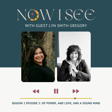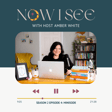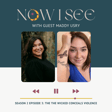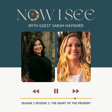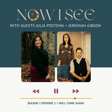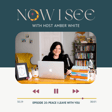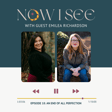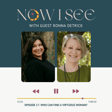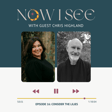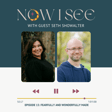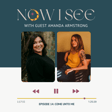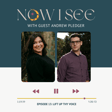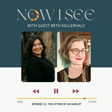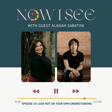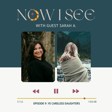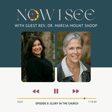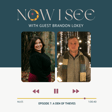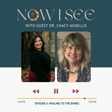Become a Creator today!Start creating today - Share your story with the world!
Start for free
00:00:00
00:00:01

What Shall I Profit You?: Showmanship and an Assemblies of God Upbringing with Danea Males
In this fun and insightful episode, I’m talking with Danea Males, a local photographer and photography teacher who spent the first 20 years of her life in the Assemblies of God congregation.
Danea has since left the faith and done quite a bit of research on the history of the church, its ties to Pentecostalism, and … potentially even to the Carnival circuit.
More from Danea:
Visit Danea's Website
Follow Danea on Instagram
Links
Support the Podcast
Purchase Some Merch
Visit the Now I See Website
Follow Now I See on Instagram
Transcript
Introduction to 'Now I See' Podcast
00:00:01
Speaker
I was lost in utter darkness I was trapped in toxic shame I was bound by my religion Till I chose to break away Now I'm finding my true colors For the first time I feel free Now I'm learning self compassion And as I heal I'm finding peace
00:00:51
Speaker
Welcome to Now I See, eye-opening stories from the formerly faithful. I'm your host, Amber White, and here, me and my guests share our experiences in loving and leaving rigid faith systems. Together, we shine a light on the dark corners of these institutions and share the joys of rebuilding life on our own terms. I promise you'll leave inspired, even if you are a little teary-eyed.
00:01:23
Speaker
Hi, and welcome back to Now I See.
Guest Introduction: Denia Malice
00:01:26
Speaker
I'm your host, Amber White, and we have another new denomination being represented on the show today. I'm talking with Denia Malice, a local photographer and photography teacher, and another friend of mine from group therapy, who spent the first 20 years of her life in the Assemblies of God congregation. Denia has since done quite a bit of research on the history of the church, its ties to Pentecostalism, and potentially even to the Carnival Circuit.
00:01:59
Speaker
It's a fun and interesting episode that I hope is as fun to listen to as it was to record. Quick reminder to check the show notes for more information and for ways to help boost the show. Thank you so much for your ongoing
Denia's Assemblies of God Upbringing
00:02:14
Speaker
support. We are almost at 8,000 downloads of this podcast, which blows my mind every day. It's been a beautiful journey and I'm glad to still be on it. All right, let's get into the episode.
00:02:42
Speaker
Hi, Denia. It is great to have you on the show today. Listeners wouldn't know this, but they may be able to tell by our conversation that we actually know each other pretty well. We met in a unique way and we've become good friends and I'm really excited that you wanted to come on the show and talk about your experience. We have not talked about the denomination that you come from yet. And so I'm really excited for listeners to have a new experience and maybe learn something new, but also to hear the similarities that you still have despite the denomination difference. So thank you for sharing today. I'm really glad that you're here. Hello, Amber. Thanks for having me. I'm very excited to be here and nervous. Well, I am very mean. well I know. But we'll we'll make it through. We will. And it'll be great.
00:03:34
Speaker
So let's start like we do every episode. I would love for you to set the scene a little bit, talk about the denomination that you grew up in and that influenced your young life and tell us what your experience of being in that was. Okay, so I was born and raised in an assembly of God Church in a small Northeast Texas town. And it was all I knew until I moved out at age 20. And it was my world, I'll put it that way, until I like ah left and went to college. And so there was a long time of many years of unpacking all of that.
00:04:20
Speaker
Yeah, I think we've all experienced that on this show. The years of unpacking are so real yes and they feel so long. yeah I'm curious what some of the beliefs were that you grew up in. What were some of the things that your church really taught and pushed heavily on the congregation that then influenced your home and the way that you lived? um So the Assembly as a God Church is an offshoot of the Pentecostal Church, and they are fundamental Christians ah believe in the hu ah inerrant truth that word yes of of the Bible. god
00:05:02
Speaker
yeah But they also believe that being filled with the Holy Spirit and speaking in tongues was part of their journey to be close to God. And as a kid, I you know didn't didn't question much, I suppose, um but it's only been later in life where you get to step back and you get to like reflect and think, what the heck did I witness as a kid? What did I see? What did I experience?
00:05:38
Speaker
I only experienced Pentecostalism, which Assemblies of God is an offshoot of, correct? Correct. I only experienced that through my great-grandmother's church when I was very young. And I remember being pretty terrified by people speaking in tongues and like the the dramatic, very emotional, very overwhelming feeling of being around adults who looked like they were losing their minds um and who were out of control. I don't think I've ever quite understood, is the idea of being filled with the Spirit in that way, is the belief of that, that that is our way of connecting to God here on earth? Or is it more of a prophecy type belief? Like if you're speaking in tongues, then you are anointed or blessed or connected in some way that maybe others
Pentecostalism and Cultural Influences
00:06:35
Speaker
are not.
00:06:35
Speaker
Oh, okay. The answer to that question is both. Okay. um
00:06:43
Speaker
i Yes, they believe that if you um were filled with the Holy Ghost and you spoke in tongues, that you were speaking a sort of special language that only God understood. But if you um had the gift of prophecy, which is usually a man, Of course. Sometimes you felt called to pass on a word from God. And oftentimes like it what that would look like would be sort of like during the altar call portion of the service, maybe there would be like a quiet lull.
00:07:26
Speaker
Maybe like there would be just some light worship music happening, people are in prayer, contemplation, and ah someone would all of a sudden feel like they have a word from God. And maybe they may like speak in tongues, and that may be the initial communication, if you will. But then someone would have to decipher that. Someone else would have to have like a like a power of discernment or like, I don't know if that's, yeah. Do you know what really surprises me about the people that I knew who were in Pentecostalism and then hearing about your family? Because your family, they were farmers. They were salt of the earth type people. And so were my great grandparents. They grew up in the Great Depression. Like they were very
00:08:16
Speaker
salt of the earth like rock of Gibraltar type people and the Pentecostal church and the offshoots of it are so Showy, they're so emotional and they're so over the top in ways that I did not experience in my family's church um That it really kind of surprised me because I never saw my grandparents that way ah In their everyday life. They were very structured working strong, like quiet people. Grandma had a penchant for gossip, but generally very upstanding people.
00:08:55
Speaker
yeah um And I think it's interesting that your family was the same way, but they're so drawn to and attracted to this very vibrant, emotional experience. that is so out of just at odds with the way that they live. And I'm wondering if you can speak to that into living that kind of life, that difference. You know, a couple years back, I actually started doing a little research and wondering like, where the heck did this church even come from? um And I have learned that Pentecostalism
00:09:36
Speaker
which is you know the the root religion um and Assemblies of God is like the offshoot. Pentecostalism started in a church on Skid Row in 1900s LA. Wow. It was a church that I feel like appealed to a lot of down and out folks, but beyond that, they were also inclusive. interesting. We had, ah yeah, like a both like black and white congregants coming together. They even had women in positions of power, um or or not power, but you know, like higher ups in the church, if you will, influencers, if you will.
00:10:21
Speaker
women that had a say. And ah speaking in tongues just miraculously happened one night. And it was quite the spectacle, quite the like, you know, like, shocking. It's quite shocking. But, you know, through music and prayer and community and people who are on hard times, who need a who need ah something to hope for, something to get them through. It was very appealing, that sort of spirit-filled church environment. And it was from there, there was the the it's called the Azusa Street Revival, um is is what the the event that happened. Pentecostalism was born out of a church revival.
00:11:20
Speaker
Interesting. And it spread across the country. I don't know this for a fact, but I do know just kind of based on the traveling evangelists that came to visit my church as a child, like that tradition of going out and spreading the gospel. It makes me think of like depression era tent revivals. And a lot of those tent revivals traveled with the with the circus, with the carnivals, traveling carnivals. And so I feel like that kind of showy aspect of worship went hand in hand with that showman tradition of like traveling carnivals. i don't know Again, I don't know this for a fact, but my dad's
00:12:15
Speaker
a father was born and raised in a rural a southeastern Oklahoma town that was home to a traveling circus and there's like a there's a carny cemetery in this town and so I just have this like the story in my mind of rural Dust Bowl Oakies, traveling circus, traveling evangelists, having tent revivals, and putting on ah ah putting on the show but on a
Community Pressures and Rituals
00:12:52
Speaker
show. They put on a really fascinating show. They really do. It is fascinating. it's so When you're talking about small towns,
00:13:03
Speaker
people who are in poverty or if not in poverty quite poor with little opportunity. I mean, it must feel larger than life to see someone speak in tongues yeah and to feel like despite all of the hardship around you, there's some sort of magic They would not call it that obviously but the feeling of something so big and special and bright and it must be a spring in the desert feeling. Sure. And I think that makes a lot of sense and I bet carnivals.
00:13:40
Speaker
felt the same way, right? Like, oh, we see the same thing every day, all the time, and all of a sudden there's an elephant, yeah or a tiger, or there's there's something else in the world that's exciting and interesting and beyond huh my life here, which is super bersad in so many ways, not speaking to the, you know, the it's obviously sad people are in poverty, but it's sad to me that there is so much opportunity to be preyed upon when you are that secluded and out of touch with resources that could make your life better and make you feel more secure and less likely to be swooped up by an extremist group.
00:14:28
Speaker
And while carnivals are less predatory, And I think they're a lot more fun probably. It's interesting that religion kind of fills that gap for a lot of people and there's almost a blessing on it. yeah Like you can go and have this really hyper-connected vulnerable, emotional experience, but God blessed it so it's okay when there's so many things that are awful um within those religions. And, you know, just based on the being part of a small community where everybody knows you and watches you and you have to be so careful. I think that's really interesting. And I think it's interesting that so much money gets wrapped up in this, despite the fact that it's small rural towns of people who are like your folks' farmers and
00:15:19
Speaker
Well, Pentecostalism spread all over the country. it like Existing churches were converted to Pentecostalism. And then somewhere along the way, there was a faction of the Azusa Street revival that decided they needed to give off on their own. because sort of the head preacher was a black man and a group of white men decided no it's not godly for us to be serving under this black man so we're gonna go start our own thing which
00:15:55
Speaker
was the Ascent Wizard God Church. Fascinating. anything like It's really funny to me. i didn yeah These are things my parents didn't know. This is something we don't we don't learn this in Sunday school. This is something i I found out like just in recent years through my own research. But it's just like, oh, yeah. This is baked in. Here it is from and the get go. It's always baked in so long ago. In the church that you grew up in, did you experience any leftovers from that racism? Do you feel like it carried through to your denomination, your specific church?
00:16:37
Speaker
Yes. And i I mean, it wasn't, I don't think it was like intentional, like it's at the time or anything like that. It was just like, but it was obviously a white church. You know, no, no black people, no black families in my church. The church we ah started attending later and like later in my teens um did have some black families in there, but still, Predominantly white. Yeah. Everybody in charge is white. Of course. and know and They probably always will be. yeah And a man. And a man. Yes. Did you ever see your parents participate in you know being filled with the spirit or your dad especially? Did that happen in your family? And what was that like if it did?
00:17:28
Speaker
It did. I have ah seen both of my parents speak in tongues and I have spoken in tongues. I thought i didn't realize. um I feel blessed. yeah Definitely faking it.
00:17:45
Speaker
um But I was doing what I thought I had to do. Of course. Yeah, so the um yeah the services were structured in a way that we would start with some worship praise and worship songs. When I was a young kid, we had the hymnals, but by the early 90s, we had gone to the Hillsong style like praise and worship songs that just get sung over and over and over and over and over and over again, which I have learned is like, you know, brainwashing. Turns out. Turns out! That's very emotionally manipulative.
00:18:28
Speaker
um Yeah, like there would be like you know some praise and worship songs at the beginning, and then church announcements, and then the preacher would preach his sermon, and then after the sermon was the altar call. And this is the opportunity to either dedicate or rededicate your life to God. And that usually meant, you know, walking down to the front of church in front of everybody there.
00:19:01
Speaker
um to be to pray or to be prayed for and all the while there's music there's people in the congregation that are singing praying crying um some people are being slain in the spirit which means people are falling out on the floor during praise and worship some people are dancing in the aisles ah It's wild. It is wild. It's a show. For sure. It really is. And as a kid, it was definitely ah scary, but it felt important. And it felt, and because my parents were wrapped up in it, it felt like, okay, well, this must be, this must be it. This must be how we ah worship um and conduct ourselves.
00:19:57
Speaker
Yeah, I imagine watching parents that like yours that are very solid stable like very structured farm again like hard working people be that overtaken is particularly impactful. Yes. Because in the rest of their lives they're not No. They're not this emotional, right? like They're much more reserved and, you know, poised. And I bet that is just really overwhelming to experience. And that would have an impact on me too, for sure. I mean, it definitely becomes normal, you know, like a it like it was normal to me.
00:20:42
Speaker
but also very like yeah take seriously, it's real, yeah like scary. your your Your salvation's on the line. yeah Your eternal soul. No big deal. ah I feel like we could do an entire episode on altar calls and every everyone who's been on the show would have something to say about an altar call. They are the most emotionally
00:21:13
Speaker
forceful part of a sermon. And you mentioned that walk down the aisle to the altar. That is one of the most emotional experiences of my own life that I can remember, is the feeling of like being out of breath. My heart's racing. I'm scared to walk down the aisle, but I know that I feel this like pull, this emotional pull to do it. And we would call it God, God's calling you to do blah, blah, blah. But there's it's it's hard to explain how someone who would normally be so reserved just gets swept up in the emotional, it's like,
00:21:48
Speaker
It's like being in a Taylor Swift concert. Everybody's gonna participate because it's just this hive mind of extreme emotional waves that come over and it's and it's then it's tied to eternity and heaven and God and this big, big, big idea of what we are and where we
Assemblies of God: Cult-like Experiences?
00:22:08
Speaker
come from and it is just so deeply emotional. And now I realize I'm very manipulative. Yeah. very good marketing to make you feel more attached. But there's also the sense that, you know, everyone is watching you when you're walking down the aisle. And now it may be a little less in a Pentecostal setting where everybody's kind of all over the place doing their thing. But in the church that I grew up in, everybody's very still.
00:22:33
Speaker
We didn't do a lot of clapping. It had to be noted that the clapping was for the Lord, not for the performer. very We took it very seriously. And so people are watching you and then there's so much wrapped up in what ends up being three minutes. And the high is unreal. And the calm down from that high is is wild. Like the physical feeling of coming down from that is, I don't think I'll ever forget it. It's ah it's extreme. And so for our folks listening who maybe didn't experience that or who are like, why is the why are these such a big deal? It's just a lot of feelings that you normally don't get to experience.
00:23:17
Speaker
coming over you and then your entire community in this like this weird moment that cannot really be, that I can't explain even still after all this time. Yeah, I, you know, I would at this point, yeah, I would say I was raised in a cult. Yeah. It took a long time to be like, Oh, okay. Yeah.
Televangelism and Prosperity Gospel
00:23:40
Speaker
Kind of checks all the boxes. You have that sort of insulated community that shared experience. You feel very much, you know, we're we're taught that we're God's chosen. We're the only ones, you know,
00:23:57
Speaker
Like we've all been told. You know have bad news for you, but my church was the only one. Right. no Exactly. You can't possibly. You cannot possibly be the one. Yeah. You had that. You felt special. You had that feeling that this is your your your place, your destin place, your destiny. Yeah. Yeah. There are some famous people associated with Assemblies of God and something you mentioned to me in your research is the the money aspect of Assemblies of God. I'd love to hear more about what you've learned about that and your experience of it. The Assemblies of God, you know basically, their theology is the same as Pentecostal, except we get to be you know we get to like look modern and dress modern and are way more mainstream. And I think part of that is tied to this commercialization of their religion.
00:25:00
Speaker
we've you know We've talked about how the Pentecostals were very like showy, Assemblies of God, even more showy. And televangelists, evangelists tend to be maybe a little predatory. And they like taking they like taking people's money. Part of going to church, of course, is tithing. I don't know if you if you grew up Oh, yeah. Okay. Right. everybody Everybody has to pay up. 10%. Uh-huh. And it's, ah you know, over the years has led to some, you know, more ah famous names, some not, but like I remember going to Jimmy Swaggart Revivals. Oh my goodness. his At his church flash like in Baton Rouge, Louisiana.
00:25:52
Speaker
And big huge church, you know, we're talking like this is like a Giddy's era mega church with TV cameras and full orchestra and big show. And my parents were drawn to that kind of like energy and that kind of style of evangelism because part of that tie to money, part of the things that they would tell you, these evangelists and televangelists would tell you, you know, like, if you're paying your ties, if you're giving your money to this church, or you're giving your money to God, like you're going to prosper.
00:26:30
Speaker
a you know, you're going to be rewarded. And so like, okay, well, you know, we're going to give our money in hopes of being rewarded or being blessed. And 80s and 90s, I feel like was just like the heyday of things like the Trinity Broadcasting Network, and Jim and Tammy Faye Baker. infamous infamous individuals. And then like today we have parody shows like the righteous gemstones, which i clearly my husband absolutely adores that show. It makes me it makes me cringe sometimes. It's so good. They're not wrong.
00:27:17
Speaker
But yeah, like that that whole, like again, like out of the carnival tradition, out of tent revivals, we have I grew up with like these traveling evangelists like visiting my church all the time, and they would have week-long revivals, and they would have merchandise to sell. Of course. you know They'd have either music or a devotional or whatever, and so like that's you know that's how they made their money. and And then when we have an era of you know TV broadcasting and cable and all the things, we've got to put that message out there. We've got to get it out yeah to the world. You have to. So we can get this money. So we can save Souls, Denia. What are you talking about?
00:28:11
Speaker
Right. This is about eternity. Yes. Not the things of this earth, but don't forget to give us that. Right. Right. It's amazing that you are a part of that. So my my church is very different in that we kind of issued that kind of showmanship. um That doesn't mean we didn't have our own issues. But being part of that at that time is a huge cultural experience. And in in some ways, maybe even a little Americana, because it's just this cult following, no pun intended, of these personalities that really don't make any sense in the context right of the belief system, but they're so they're larger than life.
00:28:58
Speaker
And so many people got swept up in that, and I think we we're still seeing the effects of that time and that wave of televangelism. even with the fallout that we see from it now. I mean, I don't know that anybody's been investigating more than Jim and Tammy Faye Baker, but i but people will still do it. And they were huge. And I remember you telling me that your family, like talking about the money aspect of this and like how God will bless you, your family ended up becoming quite, your dad was quite successful in his business.
00:29:35
Speaker
huh was Was there talk about that being because of God's blessing on your lives, because of your faithfulness, that sort of thing? Yup, even to this to this day. My dad was a very hard worker, um very strong work ethic, took care of a lot of people, took care of my family, of course, and then his like extended family, my extended family as well, he will tell you like he didn't do it, God did it.
Questioning Faith and Personal Identity
00:30:08
Speaker
And I'm like, no, no. you
00:30:11
Speaker
you did it. It's all you. Yep. But he'll be like, no, it's just just just God and just like, God god bless us. And I, you know, I gave money to Jimmy Swaggart, so I got blessed. That's really interesting. I remember thinking as a kid, because there was always the talk in my church too about, God will bless your life if you... but And I remember thinking that some of the most faithful, the most, at least by appearance, faithful people of our church did not have a lot of money.
00:30:48
Speaker
And I remember thinking like, well, how are other people sick? There are people that are successful financially that don't go to church. There are a lot of wealthy atheists in the world. So it is always so interesting to me that that could be preached so heavily and people cling to it when the evidence for it is really quite the opposite. And that if you look at extreme faith systems, you're going to see a lot of poverty. lifting up a few people correct that become the display of God's blessing if you. hu And I think that's really one of the most predatory things about it. Absolutely. I would say like the my childhood church, you know I wouldn't say was like a wealthy congregation at all. um
00:31:38
Speaker
very small town, very rural community. But as years went on, my family went to went to another church called, it they they called themselves Church of God, but still Pentecostal Church that had megachurch intentions. They started in a little storefront, but then like got you know enough of a following that they were able to like buy some property and build a building. And then the next thing they did was like start a school and you know it was big time um in its heyday, like to two services on Sunday you know like to meet the needs of their congregation. Yeah, just kind of try to
00:32:26
Speaker
grow and grow and grow in the style of like someone like Joel Steen, kind of like mega church vibes. And so that was very much dependent on the show. You know, like very much dependent on like having the best singers and the best choir and the best band and having like the best like audio visual team, camera crew to like record it all. Incredible. Yeah. So at some point, this starts to take a turn for you. right You said at 20, you left. But when did your questioning of all of this start to happen? When I was in high school, I went to um my small town's public school. I, of course, was one of the creative weirdos.
00:33:21
Speaker
um who ended up having like a lot of ah gay friends. Turns out I'm also gay, but at the time was just couldn't even think about it because of my religion. ah But I just it it just like really like hurt me. And like, I just could never wrap my head around the fact that that my friends were wrong in some way, that there was something wrong with them. Turns out it was, you know, it's, it's me. Right. from inside the Right. Exactly.
00:34:00
Speaker
ah But, uh, like it started there in high school and I, for a number of years, still went, still believed, just felt like, you know, either, either I'm going to change it from the inside or This isn't my church and I've got to go find another church. But I still went with my family because I was not about to rock the boat. I was not about to tell them that I've got to go. And I went to ah junior college in my hometown. like I lived at home and went to community college for a few years.
00:34:39
Speaker
And the theater department did a production of a play called Angels in America. It's by a Pulitzer Prize winning author named Tony Kushner. They made a HBO miniseries out of the play a couple years back or it's been a while now. um But this play has homosexual characters and one of them has AIDS. And it was a no, I mean, who cares? You know, it's just like community college drama, drama department doing a play. But word got out. Oh, no. Oh, yes. I shook this small town. Word got out.
00:35:22
Speaker
and all the churches, or not all of them, but a lot of the churches, mine included, were signing petitions, were protesting, were making a big deal, and wanted this thing shut down. I was a wee little photojournalism student at my community college. And I got to like see this thing unfold and got to really witness some ugly stuff, some some hatred, ah some scary stuff. There were some scary scary fringe protesters, Allah, Westboro Baptists, kind of crazies with their really hateful signs and their lewd stick figures. wow and yeah And I was just like,
00:36:17
Speaker
i in my heart of hearts, I just can't vibe with this religion anymore at all. But once again, terrified of my like, of upsetting my family. And so was definitely not going to rock the boat. Funny little story, I, ah my parents forbid me from going to see this play. wow And because I ah lived under their roof, like they they were paid they were paying my way. um I was like of an obedient daughter and I did not and did not go see the play, but I was absolutely out there with my camera photographing protesters and photographing the whole the whole thing.
00:37:01
Speaker
And that experience actually was very formative for like a handful of like my friends that also went to that community college. We still talk about it today. That's huge. Yeah. Yeah. I mean, it was scary. It was like bomb threats and stuff coming in. and But the college didn't back down. They did not back down. Wow. The director didn't back down. The student actors didn't back down. The president of the college didn't back down. It made national news. but The college president won like this was awarded this ah Paul Newman Humanitarian Award wow for like standing up for his students and faculty. And so that was also the flip side of that.
00:37:51
Speaker
seeing seeing those educators stand out for their students was also um incredibly inspiring good for me as a as a young as a young student. That would be, especially if you were part of a congregation that was involved in the other side. That's and that's remarkable. yeah I'm really glad that that's how that turned out. Yeah, that's really neat. And when I moved out of when I moved out of my parents house and like transferred to university, I just quit. I just quit. I quiet quit yeah um' going to church. yeah um Of course, when I would visit my family, I would go to church with them. And then ah when I was 25, I lost somebody, my
00:38:42
Speaker
boyfriend died in a plane crash, and after that, I was like, I'm i'm done done. Done
Leaving Faith and Family Dynamics
00:38:48
Speaker
done. I'm done done. That's a real feeling. and my and And like my parents didn't really push it at that point either, you know, like my family surprisingly is really non-confrontational.
00:39:04
Speaker
about that kind of stuff. So like under the circumstances, like they were just like hands hands off the situation. In some ways that's kind of nice. I'm sure it causes other issues if every everyone's. Oh, right. Right. Very, very true. Very true. Being non-confrontational can have just as many negatives as being confrontational. It turns out it's really interesting. Yeah. I'm glad that you didn't have to force your way through stepping back too much, um that you felt like you could do that. Does it come up now? Because that's been many years ago.
00:39:49
Speaker
It doesn't really. my I mean, I'm still very close with my parents today, even though sometimes they're a little frustrating. um you know but But we're still in each other's lives and they don't they don't pressure me ah about it anymore. I think I'm i'm grown.
00:40:09
Speaker
know yeah And they don't even go to church anymore, but they still very much believe. Yeah, my parents are tired they're they're tired. They're tired and retired and their kids are out of the house and so they they do on Sunday mornings though watch their favorite televangelist that comes on after the Sunday morning program and they do have their like daily devotional and like it's still very much important to them. They're just not going for the show. They're not showing up for that. They're actually resting on Sundays now. Yeah. ah I think about that a lot about how you know it's preached. It's like this day of rest. You need to have this day of rest, but you're going to like multiple services and going through all this rigmarole to have this show of like how you show up
Embracing Atheism and Personal Growth
00:41:00
Speaker
and what you do. and
00:41:01
Speaker
the least restful part of the week. It's exhausting. It's exhausting. Absolutely exhausting. It'll drain you so fast. So I'm curious what your belief system has morphed into now, what, you know, your view of the world used to be ah much like mine, much smaller and more controlled. But now you mean you have a lot of freedom. You're a photographer. You have your own business you teach and you've moved kind of far away yeah from your family and you're married. And how has your view of the world and spirituality or God, how has that changed?
00:41:39
Speaker
Now I would say that I am an atheist. I don't really have a spiritual practice at all these days, but I am looking to and have been over the past like year and a half, like through therapy and through yoga and meditation, like really learning to put back into myself. I i am the religion now. Even though even though like I don't really I can't really tell you exactly what that looks like But you know, it's the self-care and it's the you know, just coming out of that religion coming out of like my traditional patriarchal home I very much was learned, you know taught to be the people pleaser and taught to run around and make everybody else happy and put everybody else's needs before my own and now I'm 45 and I'm I
00:42:34
Speaker
Like I have to, I have to take care of myself at this point. So like I don't really, yeah, I don't, I'm not attached to the idea of like ah the God I was raised with or anything like that. But I was very fortunate also in the fact that my parents sent me to college and that made all the difference.
00:43:03
Speaker
um even Even my little community college, like that whole story about that play and the whole like fallout from that I learned more from that. I learned more about the world from that alone. yeah um And I went to art school and I actually went to college not too far from my ah from home. i only went i My college was only like two hours from home. from home. So I stayed very connected and close to my family, but I also had this other life at the university and met many wonderful people people and broadened my horizons and developed a passion for travel and making art. So as a result, I feel like coming out of my small town and coming out of my small town church and
00:43:58
Speaker
ah testing myself, um you know, really broadened the horizons and made all the difference today. for to here the makes make Makes me the person I am now. Absolutely. Education is something that I attribute to a lot of my sanity currently. My current levels of sanity definitely come from being actually educated on the world around me and not told. I don't know that they intend them to be falsehoods, but they are very biased beliefs about the world that are you know taught from a very specific perspective that keeps you kind of locked in. It's been a game changer and I'm glad that's true for you too.
00:44:44
Speaker
My parents to me are also kind of a conundrum, but i I love them for it. For all the strictness and all the fundamental Christianity that I was raised with, they were also like, well, you need to, you know, you want to go to New York, let's go to New York. You want to like go to college, okay, we'll pay for college. And I'm like, and i'm like okay, y'all confuse me, but I'm i'm gonna do it. That is not a lot of people's experience. I know. I know and i i know love that that happened for you. I think that's so great and I'm so glad to get to know you because of that, right? We probably would not know each other if you hadn't had those life opportunities. They're huge. I remember being so behind when I got to my university.
00:45:34
Speaker
not because I wasn't smart or capable, but because I just had so many gaps in my education from being homeschools from one perspective. Um, the first time I learned about evolution, I was 22 years old. I was way behind my peers when I was there. And I just remember thinking like, I would like, like sitting in my apartment crying at night because I just could not, I felt so behind and it was so much harder for me to get the work done. But I just remember thinking, like if I can finish this, I'm going to be OK. And there really is some kind of drive that comes up when you haven't had something that you know is going to change your life that kind of helps you through the misery of all the complications that
Music, Photography, and Wrestling
00:46:18
Speaker
can come with that. And I'm i'm glad we both got to to have that because it is it has changed my life. yeah
00:46:27
Speaker
And I'm also curious how your relationship to that sort of showy salesmany kind of feeling, how has that changed over time? And what would you say your relationship is to that sort of presentation of things now?
00:46:48
Speaker
Well, I am still very much deeply moved by music. um So me and my husband definitely go to see a lot of live music. um I feel like going to see live music phil definitely fills the soul. um like Like I remember um it doing, it's just not maybe not so emotionally and manipulative. I think that's why ah so many fundamentalist style churches don't like it. Yeah.
00:47:20
Speaker
Cause it mimics that, it has that, not mimics, but it has that same effect. Yeah. Yeah. and was like somewhere else No, only, only Jesus. I personally was not somebody who wanted the spotlight. I, as a kid, like my parents, you know, I think really wanted me to be a musician and like, I took like voice lessons and piano lessons and I took violin lessons and I was in the orchestra, middle school and high school, but I was terrified. as a musician. I did not want to be in the spotlight at all. um And then I found ah photography, which is out of the spotlight, know or is the spotlight, you know, gets I get to like, you know, direct the lens. And like I felt way more comfortable behind the camera instead of like in front of the camera.
00:48:12
Speaker
And so for me personally, no, I i am i am i am not looking for that kind of thing. But I do joke about ah professional wrestling. how I am not a professional wrestler. But my husband is ah is a fan of professional wrestling and we watch professional wrestling here at home and we go to some professional wrestling here in town. And it cracks me up because that is something else that is out of the carnival tradition. The tent revivals and like the the freak show and all it's not other things that came out of that. So it's like that kind of a
00:48:57
Speaker
ah performance is a is really fun, really interesting to me. Yeah, that's awesome. My spirituality comes from music and professional wrestling. I think it's great that you kind of kept the fun parts of their experiences and detach them from a higher path. Right, right. Because I think that's where they're meant to be. but I have very averse to that kind of manipulation. And so I find that if I want to experience that, it's also like music or like comedy, something that kind of gets you like hanging out with people. I'm very social. So like I love when we hang out, I always get like a big boost from hanging out and
00:49:47
Speaker
That does it for me, but anytime somebody's selling me something, I'm like, out. I might need to work on it a little bit, actually. I might be a little too harsh, but it's funny how that can come out in so many different ways. I love that you found a healthy outlet since most people upset. so
00:50:09
Speaker
That's great. Oh, Dania, this has been so fun and insightful and just a
Church Manipulation and Politics
00:50:18
Speaker
blast. I really enjoyed recording with you. And I'm excited that we're at the last questions because I'm really looking forward to your answers. But I'm sad that we're closing up. We'll have to go get coffee and talk some more. yeah ah But I'm really excited to hear your answer to these questions. So the first one is, what is something you see clearly now that you didn't see before when you were the most immersed in your faith?
00:50:45
Speaker
I have been thinking about this question all week because I knew it was coming. And I still don't have a concrete answer um because there's a lot of little facets. um But I think like the biggest the biggest thing for me is seeing just how manipulative the church is. Even when I left, um and even when I stopped going, I never thought it was ultimately that harmful. But now that we live in a in the era of Donald Trump, and I see how my parents got swept up in that, and how I can't even begin to wrap my head around how my parents think that this person is a Christian godly man.
Education's Role in Broadening Perspectives
00:51:36
Speaker
Like now I'm like, oh, it is harmful.
00:51:38
Speaker
yeah This has been real. this this Because when I left the Church of God, the mega church wannabe, the preacher there was absolutely preaching politics from the pulpit. And this was 2005, five 2004. This was 20 years ago. And here we are now. in the situation that we're in. um yeah So yeah, I think um I believe that my parents and I mean i believe that many believers are are good people and they want to be good and do good, but they're really misguided. And being misguided is affecting the entire nation, is affecting a lot of people in sad and scary ways.
00:52:26
Speaker
Very sad and very scary. It's interesting to me that the folks that I know who've left and gone and gotten educations or found ways to educate themselves in one way or another. the tools that you get from that change the way that you view the world and the way that you think about politics and the way that they should function and the ability to create freedom for everyone, right? And so I hear a lot of folks like us who left these situations say things like, I'm not trying to take my parents out of church. i i would They're not hurting anyone, right?
00:53:02
Speaker
But where the problem comes in is that they're then trying to control other people's decisions, right? and Correct. Their livelihoods and the way that they get married or take care of their bodies, lots of different ways. And I see the folks who didn't leave or who didn't take opportunities to educate themselves or didn't have, in many, many cases did not have opportunities to do that. And the tools that they have to think about politics and the way that it affects the world are super limited.
00:53:38
Speaker
and it's hard to to hold that space of compassion and this can't happen at the same time. Because certainly there are folks who are willfully ignorant, but I think there are a lot of cases where they just have the resources are not there. And I think when you're looking at extremely rural areas with limited opportunities, with limited funds, with limited it's very difficult to create that level of understanding when you're surviving. And that's all you have. yup And so it's it's tough to look at it and say, how could you when
00:54:24
Speaker
I remember living it. huh And when that's all you know and that's everything you have and that's that's your world, you just don't have the capability of seeing it differently. You have to get out. You have to write be exposed to something different. And a lot of times that just doesn't happen or it isn't going to happen. know And it sucks. And it's hard to watch people get hurt because of that. Which is why I think so many of us are huge advocates for public schools and funding public schools and paying teachers and making sure that even rural areas, even poor areas, even high crime areas have good schools. It's a value that I think we understand in a unique way.
00:55:17
Speaker
because there's nothing you can do if if people literally are looking at you like you're crazy because they have not had any chance to be exposed to the knowledge that you have. It's tough. And again, I'm i'm really grateful that we both got to have the opportunity absolutely to do that. It's huge, life changing. Proud of us for taking the initiative too. Yeah, absolutely. It's not easy. Yeah, it's not. There are a lot of obstacles in the way, but I'm yeah i'm glad that we did the work and we're offered the opportunity to do it. And I i hope that for more people. Our last question, and this is my favorite one. ah What have been some of your greatest moments of joy in rebuilding your life post-faithfulness?
00:56:07
Speaker
Definitely ah the friends that I've met have given me lots of joy. I think about you and I probably never would have met if it hadn't been for like group and yeah like what it took for me personally to arrive at therapy, much less group.
00:56:28
Speaker
You know, um so like the people in my life, the people in my life that wouldn't be in my life if I were still in that in that ah religion. um have definitely brought me a lot of joy and in a lot of ways just being free dropping so much of like the self policing and the self like oh i can't do this because of a b and c or because you know i'm scared or or whatever i feel like not so much the christianity part but just like the
00:57:08
Speaker
the patriarchal system of that fundamental church. like I feel like I have come into the world like being fearful of a lot of things yeah um and just not having like confidence in myself to do challenging things or scary things. And I am, in a lot of ways, just now taking those risks. I love that. And just now, like you know like what do I have to be afraid of? I just need to go. I just need to do the thing. So finding that sort of self-confidence and finding my own voice as well has brought a lot of joy.
00:57:49
Speaker
Yeah. There's a lot of joy in watching you do that too. Thank you. Just so you know. Ditto. i It's so interesting to me. I have also been very pent up for a lot of my adult life um and scared to take certain risks and things like that. This being probably the greatest risk I've ever taken. Sure. But and my life has never felt better, taken off more, and been more full of gratitude and possibility and options than when I started letting go of some of that. And I love that that's something that you're experiencing too, because it's never, ever, ever too late. And I think it gets even better from here.
00:58:35
Speaker
yeah Yes. Yes ma'am. Well, Denia, this has been great. I am really, really glad that you wanted to come on the show and share your experience. I feel like I need to go watch a Tammy Faye Baker documentary now. Immerse myself in it some more because it really is so fascinating. yeah um So I appreciate you sharing the history and also your personal experience. Thanks for having me. Yeah. great Glad to be here. Yeah, me too.
00:59:15
Speaker
Thank you for tuning into this episode and being on this journey with me. You can find resources and links in the show notes. If you're enjoying the show, please subscribe, rate, and review, and follow along on social media to help us grow. Now I See is independently funded by me. If you'd like to help support the show, you can donate directly or purchase a merch item on the website. Music for this episode was made by Alana Sabatini, a former faithful and talented musician. And finally, this podcast is made possible by the incredible team at Softer Sounds, a feminist podcast studio for entrepreneurs and creatives providing technical skill with tender support.
